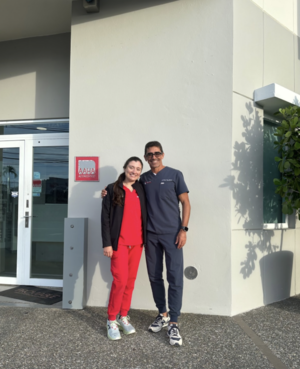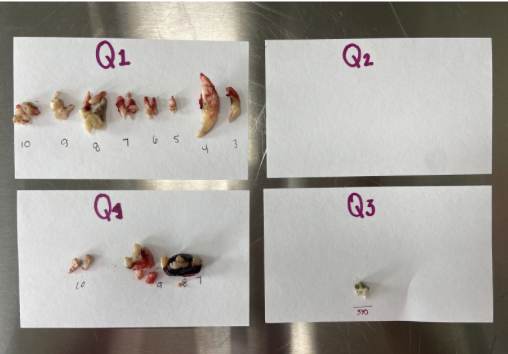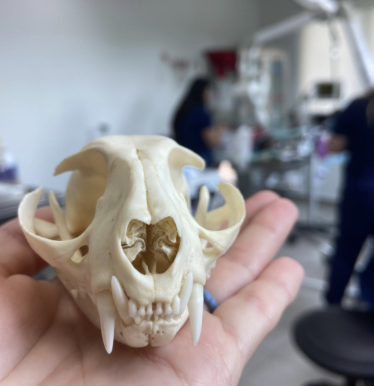STUDENT EXPERIENCE
 Thursday, February 1, 2024 at 12:00PM
Thursday, February 1, 2024 at 12:00PM
Submitted by Daniela Lopez Chanique, Ross University School of Veterinary Medicine
 My name is Daniela López Chanique and I am a 4th year veterinary student from Ross University of Veterinary Medicine. Due to being a Rossie, I had the amazing opportunity to complete my clinical year at Michigan State University. On their curriculum, they give clinical students the opportunity to go to externships. Being born and raised in Puerto Rico, on July 2023 I chose the opportunity to return to my roots in order to experience veterinary medicine in my hometown. There are no words to describe the amazing experience that I had working at Centro Medico Veterinario in Guaynabo, Puerto Rico with Dr.Jose Marcos Vega. I was very eager to be able to join Dr. Marcos Vega and interact with locals, who are Spanish speakers, during my time there. Days prior to arriving to Puerto Rico, the realization hit. Due to learning and being taught in English the whole time during my veterinary school years, I realized that I do not have the same level of medical Spanish as I had when I talked to my clients in English during clinics. Due to this, I was very nervous but excited at the same time. Being able to work with Dr. Marcos Vega really helped due to being able to see his “bedside manners” with his clients. I was honestly impressed and will apply all the skills that I learned beside him whenever I have the opportunity to talk with Spanish speakers when I start working in my future job in the United States.
My name is Daniela López Chanique and I am a 4th year veterinary student from Ross University of Veterinary Medicine. Due to being a Rossie, I had the amazing opportunity to complete my clinical year at Michigan State University. On their curriculum, they give clinical students the opportunity to go to externships. Being born and raised in Puerto Rico, on July 2023 I chose the opportunity to return to my roots in order to experience veterinary medicine in my hometown. There are no words to describe the amazing experience that I had working at Centro Medico Veterinario in Guaynabo, Puerto Rico with Dr.Jose Marcos Vega. I was very eager to be able to join Dr. Marcos Vega and interact with locals, who are Spanish speakers, during my time there. Days prior to arriving to Puerto Rico, the realization hit. Due to learning and being taught in English the whole time during my veterinary school years, I realized that I do not have the same level of medical Spanish as I had when I talked to my clients in English during clinics. Due to this, I was very nervous but excited at the same time. Being able to work with Dr. Marcos Vega really helped due to being able to see his “bedside manners” with his clients. I was honestly impressed and will apply all the skills that I learned beside him whenever I have the opportunity to talk with Spanish speakers when I start working in my future job in the United States.
 Setting my language adventure aside, I had an amazing time. Something that this clinic has that makes it stand out compared to other local vet clinics in Puerto Rico is that Dr.Marcos Vega has an amazing dentistry suite in his clinic. During Dr.Marcos Vega’s veterinary career, he had the opportunity to work with a Board-certified veterinary dentist which helped him develop amazing veterinary dentistry skills. As a soon-to-be graduated veterinarian, I was amazed at the surgeries that he had the skills, tools, and capabilities to perform. This came with the realization that during our didactic and clinical rotations in school, we were not taught as much about veterinary dentistry as I thought we would. Dentistry is a very important aspect of our pet’s life and I believe that vet schools should create more emphasis on how important it is. Due to not having much experience in oral surgery, I was very grateful to see Dr.Marcos Vega performing advanced oral surgeries such as repairing mucocutaneous oral fistulas, mandibulectomy, advanced stomatitis cases, and difficult oral mass removals.
Setting my language adventure aside, I had an amazing time. Something that this clinic has that makes it stand out compared to other local vet clinics in Puerto Rico is that Dr.Marcos Vega has an amazing dentistry suite in his clinic. During Dr.Marcos Vega’s veterinary career, he had the opportunity to work with a Board-certified veterinary dentist which helped him develop amazing veterinary dentistry skills. As a soon-to-be graduated veterinarian, I was amazed at the surgeries that he had the skills, tools, and capabilities to perform. This came with the realization that during our didactic and clinical rotations in school, we were not taught as much about veterinary dentistry as I thought we would. Dentistry is a very important aspect of our pet’s life and I believe that vet schools should create more emphasis on how important it is. Due to not having much experience in oral surgery, I was very grateful to see Dr.Marcos Vega performing advanced oral surgeries such as repairing mucocutaneous oral fistulas, mandibulectomy, advanced stomatitis cases, and difficult oral mass removals.
 Overall, I had an amazing experience during my three weeks in Centro Medico Veterinario. I was very grateful to be able to return to my hometown and being able to experience veterinary medicine in Puerto Rico. Additionally, I was able to learn and experience medical and beside manners in Spanish which really boosted my confidence whenever I need to speak any future Spanish speakers during my career. This has really sparked a curiosity in me and hopefully, I will be able to practice more veterinary medicine in Spanish in Puerto Rico or whenever I travel to other countries.
Overall, I had an amazing experience during my three weeks in Centro Medico Veterinario. I was very grateful to be able to return to my hometown and being able to experience veterinary medicine in Puerto Rico. Additionally, I was able to learn and experience medical and beside manners in Spanish which really boosted my confidence whenever I need to speak any future Spanish speakers during my career. This has really sparked a curiosity in me and hopefully, I will be able to practice more veterinary medicine in Spanish in Puerto Rico or whenever I travel to other countries.

